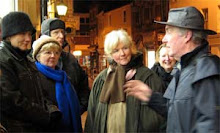
Over the centuries, there have been many authors who have penned some of the finest works of ghost fiction, but in my opinion, there is one name in particular that stands head and shoulders above the rest and who’s works have inspired generations of writers - Montague Rhodes James (1862-1936)
M.R. James wrote over two dozen short stories of a supernatural theme during the late 19th and early 20th century. His atmospheric, chilling style of writing and his unique prowess in the art of suggestion, leaves the reader having to use their imagination to fill in the blanks and to ponder the possibility that his stories were written in such a way as to “put the reader into the position of saying to himself: 'If I'm not careful, something of this kind may happen to me!”
M.R. James was to become well known amongst his fellow scholars at Eaton and King’s College Cambridge (where he studied archaeology) for his Christmas gatherings, which would later, as they gathered popularity, be affectionately referred to as the meetings of the “Chitchat Society.” It was in his gloomy candle-lit rooms over 100 years ago that he would indulged a captive audience with his latest tales of the supernatural.
One such story - “Oh, Whistle and I’ll Come To You, My Lad” is probably one of his most chilling and evocative tales and a personal favourite of mine. It is a story expertly crafted which warns the reader of what might happen if he or she should disturb that which should be left well alone. The story is set during the winter months on Burnstow Beach and in the creepy old Globe Inn, Suffolk. The main protagonist is one Professor Parkins, who has decided to take a sort break to brush up on his golf. Just before he leaves for Burnstow, one of his colleagues catches up with him and asks if he could investigate the site of the Templar’s preceptory on Burnstow Beach with a view, should the professor think worthwhile, of organizing a summer dig there, the professor agrees and sets off.
Once settled at the Globe Inn, Parkins decides to take a brisk walk along the beach. James’s description of the desolate and often wild East Anglian landscape and Burnstow Beach in particular, only adds to the bleakness of the tale. The professor had not walked far when he discovers, quite by accident the preceptory that his colleague had referred to. On careful examination of the surrounding area, he determines he has stumbled upon the site of what must have been the Templar’s church. Further examination of the ground reveals a series of flint stones set in mortar and protruding, half buried from one stone, is what appears to be a whistle. Carefully leavering the item free, Parkins decides to pocket it and take it back to the inn for further inspection.
That night after cleaning and examining the artefact, he perceives the object to be that of a bronze whistle of some four inches in length. By the light of a candle he notices an inscription "QUIS EST ISTE QUI VENIT." Parkin's Latin is a little rusty but he is able to discern part of the inscription to mean “who is this who is coming?” It's a whistle, so I should blow it he thinks and with that he puts the instrument to his lips and blows. At that instant, he is momentarily started by the whistles hauntingly distance note. Little does Parkins realise what he has inadvertently unleashed…
M.R. James is considered as one of the greatest writers of antiquarian supernatural literature that England has ever produced.
To enjoy this classic ghost story as it was intended, I strongly suggest you read M.R. James original tale, however, should you not want to wait for a copy then why not allow this 1968 BBC adaptation whet your appetite for more M.R. James chilling tales of the supernatural:
https://youtu.be/mYjtxHHjZ00






4 comments:
A splendid piece! I too was unconvinced by the 'update' of 'Whistle And I'll Come To You', what with it featuring no whistling at all. Strange. As of a think itself, it was fine, but as an adaptation or 'version' of the original, it failed woefully. Great performance from Hurt and particularly excellent sound design though.
Thanks for your comment “The Thing That Should Not Be.”
Hi Willow, I stumbled across your blog by mistake when I was searching for some information about a pub in Devzies, and I just wanted to tell you how much I have enjoyed it. I read the entire thing and I think it is a fantastic collection of stories, and having grown up in Wiltshire, it was a really brilliant read. Please find some ghost stories in West Lavington!!! x
Thank you for your kind comments 'good times tora'. The only ghostly manifestation I know of in West Lavington is the Dial House, a grade II listed building, reputedly haunted by an elderly lady.
Post a Comment